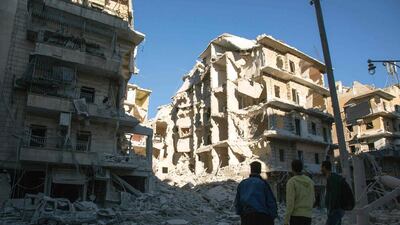ALEPPO // With pools of blood and shredded bodies on the streets, relentless bombardment by Syrian and Russian forces have reduced rebel-held eastern Aleppo to a place of apocalyptic horror.
Doctors at one of the last functioning hospitals said they were being forced to carry out swift amputations just to keep survivors alive.
“This morning alone we had 60 wounded come in,” said Ahmed, a doctor who asked not to be fully identified out of fear for his life and for the hospital, which has been under continuous attack for more than 48 hours in the new offensive.
“We’re carrying out a large number of amputations just so they survive because otherwise we don’t have the means to treat them. Many of the wounded are dying before our eyes — we’re helpless.” he added. On the floor all around him were men and children writhing in pain. With supplies of blood and intravenous drips exhausted, Dr Ahmed said the chances of saving lives was growing hopeless, especially where head injuries are involved.
Only three or four hospitals are still operational in east Aleppo where 250,000 people are trapped under government siege.
Water is now added to all the other shortages after forces loyal to the Syrian regime damaged a pumping station and the rebels shut down another in retaliation, leaving nearly two million civilians all over Aleppo without water.
The United Nations children’s agency, Unicef, reported, “Intense attacks last night have damaged the Bab Al-Nayrab water pumping station, which supplies water to some 250,000 people in the eastern parts of Aleppo. Violence is preventing repair teams from reaching the station. In retaliation, the Suleiman Al-Halabi pumping station, also located in the east, was switched off, cutting water to 1.5 million people in the [government-held] western parts of the city.”
The loss of mains water poses serious health risks in rebel-held areas as the only alternative source of drinking water is from highly contaminated wells. Safer alternatives are available in government-held areas where there are deep groundwater wells.
Unicef said it would expand emergency water deliveries throughout the city, but warned that could only be a temporary solution.
Deprived of food, medicine, security and now water, the residents of east Aleppo spent Saturday cowering indoors as buildings crumpled or burned all around them. Activists described the earthquake-like tremors produced on effect by missiles capable of razing a building beyond ground level to the basement, where residents seek protection.
“We were home when a missile crashed into our road,” said Nizar, who lives in Bab Al-Nayrab district. “Half of the building just caved in and our baby was hit in the head. He died on the spot.” As he waited to bury one child, his other son was in hospital. An air strike killed seven people as they queued to buy yogurt at a market in Bustan al-Qasr, a front line neighbourhood between the rebel-held east and government-held west. The initial death toll was 32 civilians killed with more certain to come as more bodies were unearthed from the debris.
The civil defence organisation known as the White Helmets has just two working fire engines left but no fuel for its vehicles or for the electricity generators they need to work at night.
Syria’s main opposition coalition condemned worldwide inaction in the face of “atrocities” committed by Syrian president Bashar Al Assad and his Russian allies. Jawd Abu Hatab, leader of Syria’s opposition-in-exile said, “We cannot stand the silence of the international community.”
* Agence France-Presse

